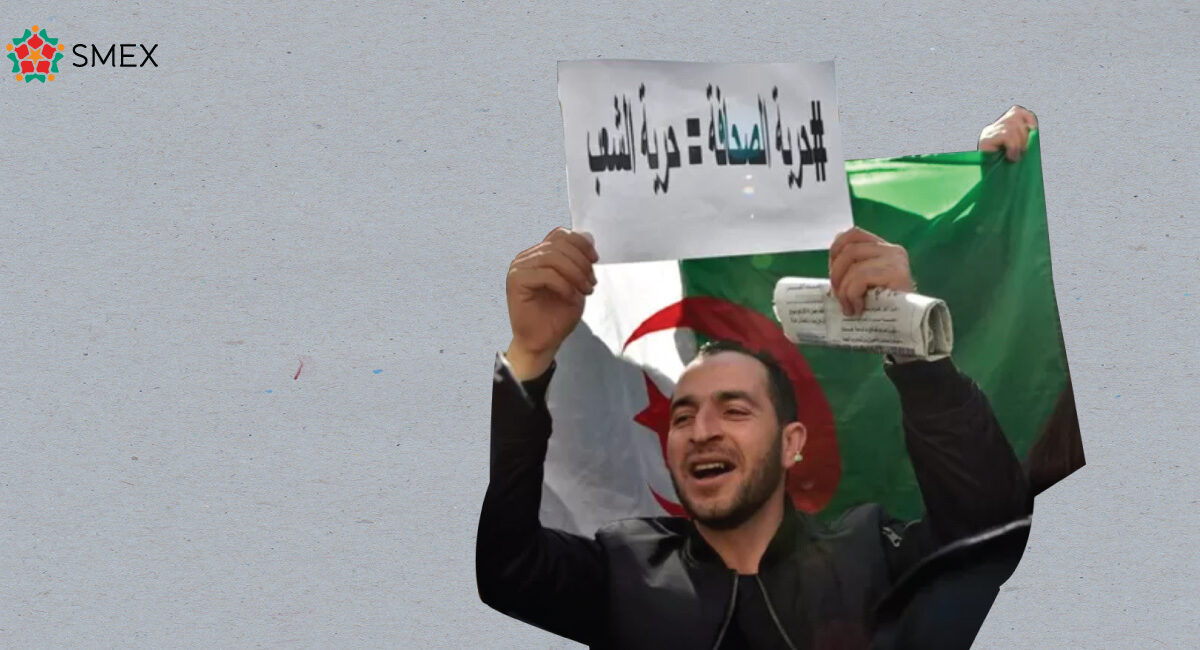In June 2022, an Algerian court sentenced journalist Ihsane El-Kadi to six months in prison for an article he published on Radio M a year earlier. El-Kadi had written the article in support of the Rachad Movement’s right to take part in the popular mobilizations demanding democracy.
Following the eruption of the Hirak movement in 2019, authorities tightened their grip on the media and digital spaces in an attempt to disseminate a unified discourse supporting the presidential elections and the army. Since then, activists and journalists have been attacked for voicing their opinions online and many have been summoned for questioning.
Violation of Privacy
One Hirak activist who wished to remain anonymous for security reasons told SMEX that security forces have even “confiscated activists’ mobile phones to inspect their content, particularly direct messages on social media apps such as Facebook, as well as photo galleries, in a flagrant violation of privacy.”
Journalists have also fallen victim to the confiscation and inspection of mobile phones. When journalist Boualem Ghimrasa was summoned for questioning at the National Gendarmerie station in Algiers, after being charged with “publishing material that could undermine national interests,” his computer was confiscated and withheld for 21 days, and his mobile phone was confiscated for 4 days. During that period, his emails were scrutinized, and he was denied access to his Facebook account. He was sentenced to six months in prison in March 2022 for the charges brought against him in 2019.
An Algerian rights activist who wished to remain anonymous for fear of prosecution, confirmed to SMEX that “there are currently more than 340 activists detained in Algerian prisons for expressing their political opinions, in addition to more than four thousand activists being prosecuted before the courts.”
This policy has been in place since the Hirak protests were forcibly dispersed more than two years ago. According to the Algerian activist, “most accusations are related to posts or videos they posted on social media platforms, especially Facebook—the most popular among Algerians—in which they expressed their opinions about the government and the overall situation in the country.”
Legalizing Oppression
Authorities have doubled down on the “terrorist classification,” which was recently added to the Penal Code by virtue of Article 87 (bis). This article has stirred widespread controversy in Algeria’s legal and political circles, as it imposes several penalties on those accused of committing subversive or terrorist acts.
In June 2021, Algerian authorities amended the definition of “terrorism” to allow for the prosecution of peaceful activists, journalists, and critics. These policies have targeted bloggers on certain websites and social media platforms, according to Amnesty International. It’s also been weaponized to criminalize the formation of political organizations by classifying them as “terrorist.”
Article 87 (bis) has become a tool to target and abuse activists, as it makes it possible to classify their actions as “terrorist” or “sympathetic towards terrorism” by charging them with organizing unarmed gatherings, sharing posts that undermine national unity and defaming national symbols and institutions.
Despite these loose yet very serious accusations, “many of the cases brought against the activists are unfounded. The goal is to intimidate and silence opponents and critics, especially on social media, although this was not the case before the popular Hirak,” according to the Algerian rights activist.
“Authorities are resorting to prolonged pre-trial detention, sometimes lasting for one or two years, but the activists are then acquitted or sentenced to time served. A few months ago, one activist died in prison due to lack of treatment, and another suffered from psychological distress.”
During the commemoration of the Hirak’s second anniversary, several human rights organizations and opposition parties demanded the release of those detained for publishing posts on social media. Afterwards, in February 2021, the Ministry of Justice announced the release of 33 Hirak activists as a first step, following the presidential pardon issued by Algerian President Abdelmadjid Tebboune upon his return from Germany, where he was receiving treatment for Covid-19 complications.
The pardon was issued as an initiative to calm the protest movement that had erupted in 2019. It mainly targeted individuals who had final sentences and others who were still awaiting trial, such as journalist Boudour Said, who was released in 2021 after being detained for publishing posts on Facebook.
However, this was very short-lived, as the authorities soon continued their oppressive policies. For example, in January 2022, journalist Merzoug Touati was sentenced to one year in prison and a fine for “publishing false news and undermining public institutions,” after he published a post on Facebook exposing the detainment conditions of “prisoners of conscience.”
Algerian authorities are still prohibiting public and independent radio stations and TV channels from hosting Hirak activists and pressuring them not to cover the protests. Meanwhile, many media outlets broadcasting online have been blocked, such as French-speaking Le Matin d’Algérie, which was blocked by authorities in 2020, and many others, including news website Maghreb Emergent and its affiliate Radio M, as well as Interlignes and DzVID.
Algerians are hoping that the ongoing crisis will be resolved by amending the relevant laws, including a draft law on the regulation of written and electronic press and facilitating the establishment of media outlets and news websites. But are legal amendments enough to prevent the violation of human rights in the digital realm in Algeria?


